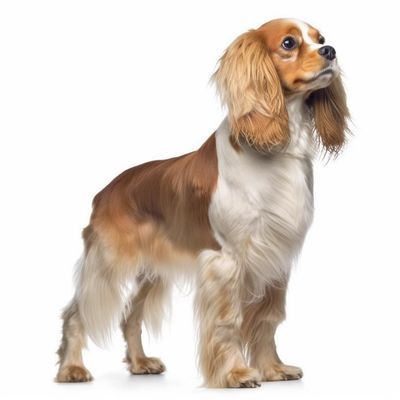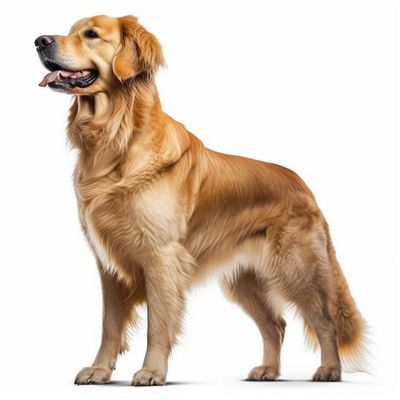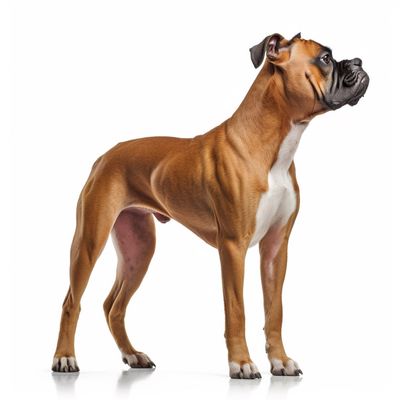Cavalier King Charles Spaniel - vs - Golden Retriever - vs - Boxer

Cavaliers have a moderate energy level and enjoy a mix of playtime and relaxation.
Cavaliers need daily exercise, such as walks or playtime, to stay happy and healthy.
Cavaliers are eager to please and can be trained easily with positive reinforcement.
Cavaliers are intelligent dogs that enjoy learning new commands and tricks.
Cavaliers adapt well to various living situations, from apartments to country homes.
Cavaliers are gentle, affectionate, and patient, making them excellent companions for children.
Cavaliers get along well with other pets, including dogs and cats, when socialized properly.
Cavaliers can tolerate mild cold but need extra care in extreme cold due to their silky coats.
Cavaliers can handle warm climates, but make sure to provide shade, water, and avoid excessive exercise.
Cavaliers have a silky coat that sheds moderately, so regular brushing can help minimize shedding.
Cavaliers require regular brushing and occasional bathing to keep their coats healthy and tangle-free.
Cavalier King Charles Spaniels bark occasionally, usually only when necessary or provoked.
Cavalier King Charles Spaniels may have some health issues, requiring regular veterinary checkups and preventative care.

Golden Retrievers weigh 55-75 lbs and stand 21-24 inches tall, boasting a strong and balanced build.
Goldens are enthusiastic and lively, always up for a game of fetch or a long walk in the park.
Daily exercise like walks, runs, or playtime is essential for a healthy and happy Golden.
Intelligent and eager to please, Goldens are a dream to train for both first-time and experienced owners.
Golden Retrievers are fast learners, excelling in problem-solving and grasping new skills.
Goldens adapt well to various living situations, from urban apartments to spacious rural homes.
Loving and patient, Golden Retrievers are gentle playmates and excellent family dogs.
Goldens are sociable and friendly, getting along with other dogs, cats, and even smaller pets.
Their dense double coats help them tolerate cold weather, but they still need warmth and shelter.
Goldens can cope with hot climates, but ensure they have shade, water, and avoid overexertion.
Goldens shed, especially during seasonal coat changes. Regular grooming helps manage shedding.
Routine brushing keeps a Golden's coat healthy, tangle-free, and controls shedding.
Golden Retrievers have average bark tendencies and may bark for various reasons, such as alerting their owners or during playtime.
Golden Retrievers are generally healthy, but regular veterinary checkups and preventative care are still necessary.

Boxers are medium to large dogs, weighing 55-70 lbs and standing 21.5-25 inches tall.
Boxers are energetic, playful, and love engaging in physical activities with their family.
Boxers need daily exercise, such as walks, runs, or playtime to keep them happy and healthy.
Boxers are intelligent, but their independent nature requires patience and consistency in training.
Boxers are quick learners and can excel in obedience training and dog sports.
Boxers can adapt to different living situations but thrive in homes with access to outdoor space.
Boxers are affectionate, patient, and protective, making them wonderful companions for children.
Boxers can get along with other pets, especially when properly socialized from a young age.
Boxers can tolerate mild cold but need extra care in extreme cold due to their short coats.
Boxers can handle warm climates, but make sure to provide shade, water, and avoid excessive exercise.
Boxers have a short coat that sheds moderately, so regular brushing can help minimize shedding.
Boxers have low grooming needs – occasional brushing and bathing will keep them clean and healthy.
Boxers have average bark tendencies and may bark for various reasons, such as alerting their owners or during playtime.
Boxers may have some health issues, requiring regular veterinary checkups and preventative care.



